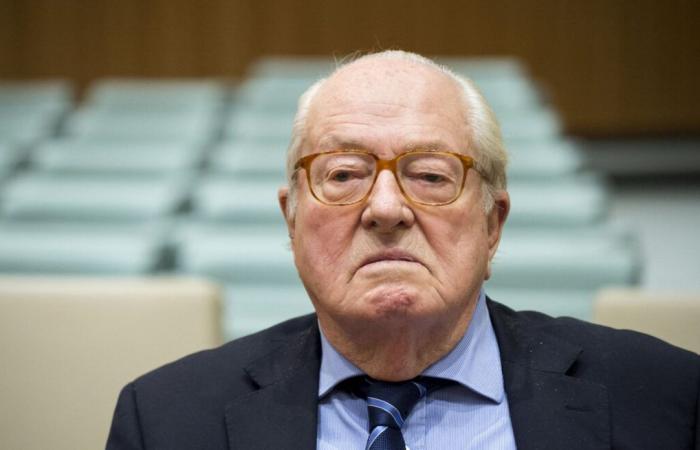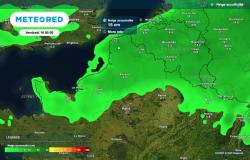
An outstanding tribune, a sulphurous provocateur in a crusade against immigration, convicted of anti-Semitism, the French politician Jean-Marie Le Pen died on Tuesday, at the age of 96, after having brought the French far right out of its marginality .
“Jean-Marie Le Pen, surrounded by his family, was called back to God this Tuesday at 12 p.m.,” local time, his family announced in a press release sent to AFP.
The former paratrooper entered the collective memory with a black bandage over his injured left eye, cultivating a provocative and transgressive image from his youth.
And until the end, the founder of the National Front (which became the National Rally in 2018) expressed no regret for the slippages, controlled or not, which earned him several convictions: gas chambers described as “a point of detail of the history of the Second World War” (1987) to “racial inequality” (1996), including the German Occupation of France, “not particularly inhumane” (2005) or the physical attack of a socialist opponent (1997).
He was also convicted at the end of the 1960s for apologizing for war crimes after having published a disc of songs from the IIIe Reich. “I am a free man,” he repeated, concerned about his anti-system posture even if it meant marginalizing himself.
Did Jean-Marie Le Pen want power? “I believe that deep down, he did not want to govern,” said journalist Serge Moati, who followed him for 25 years. “Having been considered a reprobate, an excluded person, an anti-system, in fact helped him and paradoxically gave him popularity which gradually translated into the ballot box.”
“Fuck the shit”
On April 21, 2002, he shocked the political class and a large part of French public opinion by reaching the second round of the presidential election behind the outgoing Jacques Chirac. The latter was largely re-elected after massive demonstrations against the far right.
But Jean-Marie Le Pen will have reinvented a French extreme right hitherto disqualified by collaboration with the Nazi occupier, and opened the way for the rise of nationalist and populist movements in Europe.
Born on June 20, 1928, in La Trinité-sur-Mer, he lost his father, a fisherman, at the age of 14, who died at sea by jumping on a mine.
A law student in Paris, a fighter, he favored activism and cultivated colorful friendships, like the New Wave filmmaker Claude Chabrol, committed to the left, who saw in him a “magnificent fuck-up”.
Engaged in the paratroopers of the Foreign Legion, Le Pen went to fight in Indochina, where he became friends with a future cinema legend, Alain Delon.
Back in France, he was elected deputy in 1956 and became the youngest member of the National Assembly. Then he leaves again, this time to Algeria, where he will be accused of torture – something he has always contested.
“Demonization”
A visceral anti-communist, supporter of French Algeria, Le Pen frequents the ultra-right. In 1972, he was appointed head of a new party bringing together neofascists: the National Front.
The movement stagnated then broke through in 1983, with an obsessive theme: “A million unemployed is a million too many immigrants”.
With his favorite slogan “French first”, this speaker is the self-proclaimed champion of the “little ones”, he who became a millionaire by inheriting the fortune of his friend Hubert Lambert.
But the one who manages the National Front like “a family shop” faces divisions. At the end of the 1980s, his wife and mother of his three daughters suddenly left him and then posed nude in the magazine Playboy.
Ten years later, he disowned his promised daughter, Marie-Caroline, on live television, who supported a rival within the party.
It was ultimately the youngest, Marine, who took up the torch in 2011. She first proclaimed her loyalty before excluding in 2015, after yet another anti-Semitic slip-up, this father who had become embarrassing for his project of “demonizing” the extreme right.
“Big replacement”
She changes the name of the party and begins its trivialization. “A suicide”, according to Jean-Marie Le Pen, who had theorized the coming together of all the extreme right-wing parties.
He retreats into his Memoirs, where he returns to his favorite themes, such as the “great replacement” of the French population by immigration.
In recent years, Jean-Marie Le Pen has entertained in spades. He had suggested that he would vote for far-right candidate Eric Zemmour in the 2022 presidential election.
A heart attack a year later forced him to give up social life. From February 2024, his three daughters Marie-Caroline, Yann and Marine were appointed to manage his day-to-day affairs.
After the RN’s victory in the European elections in June, and the surprise dissolution of the Assembly decided by President Emmanuel Macron, the party began to believe in power.
Countered by a “republican front”, the RN nevertheless won a record number of deputies. And Marine Le Pen, three times presidential candidate, believes in her chances for the fourth, scheduled for 2027, despite her troubles with the law.
“Judgment of History”
“Engaged under the uniform of the French army in Indochina and Algeria, tribune of the people in the National Assembly and the European Parliament, he has always served France, defended its identity and its sovereignty”, greeted Jordan Bardella, the president of the National Rally (RN), heir to the National Front (FN) co-founded by Jean-Marie Le Pen, on X.
Mr. Le Pen was a French “historical figure of the extreme right” whose “role in the public life of our country for nearly seventy years (…) now falls under the judgment of History,” reacted the Elysée in a press release.
He “will have been a figure in political life”, beyond “the controversies which were his favorite weapon and the necessary confrontations on the merits”, declared for his part French Prime Minister François Bayrou.
Her daughter Marine Le Pen was on a plane Tuesday midday that was to bring her back to Paris from the French archipelago of Mayotte, in the Indian Ocean, where she went to express her solidarity after the devastating passage of Cyclone Chido.
“Respect for the dignity of the dead and the grief of their loved ones does not erase the right to judge their actions,” reacted the leader of the radical left in France, Jean-Luc Mélenchon. Those of Jean-Marie Le Pen remain unbearable. The fight against man is over. The one against the hatred, racism, Islamophobia and anti-Semitism that he spread continues.”





